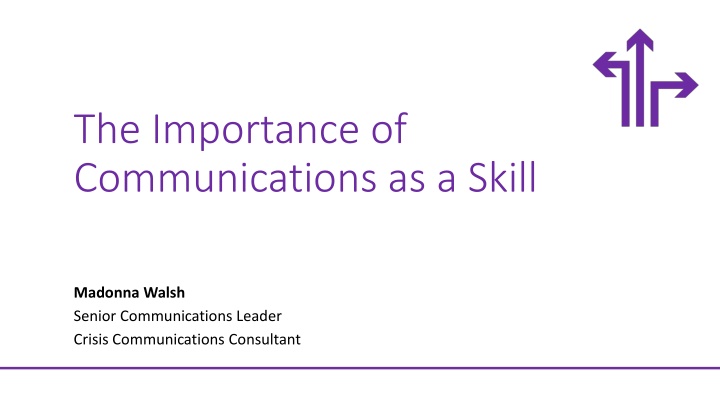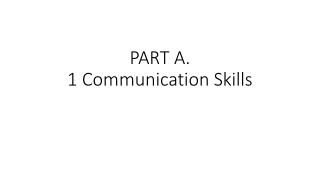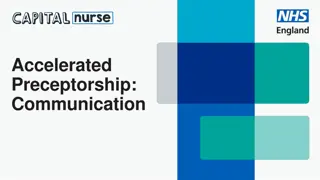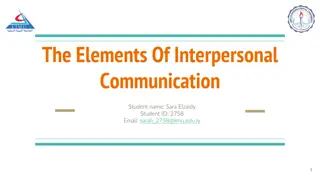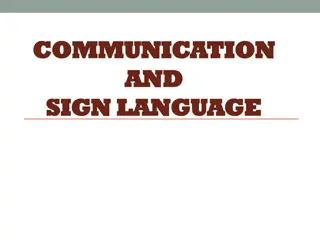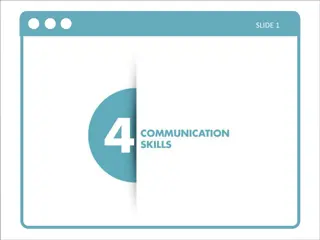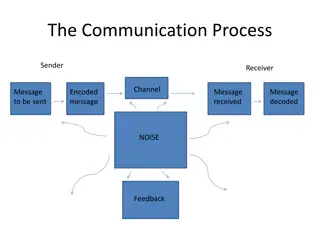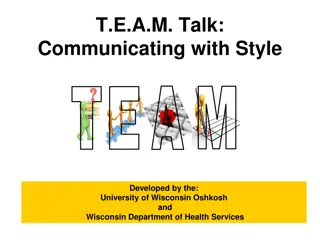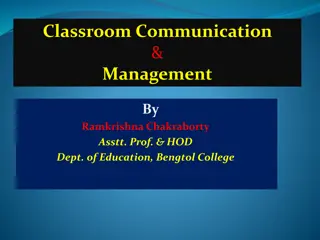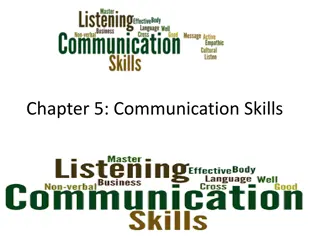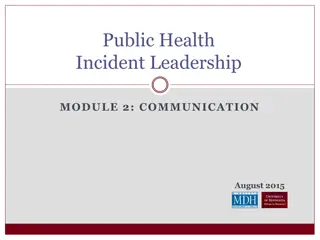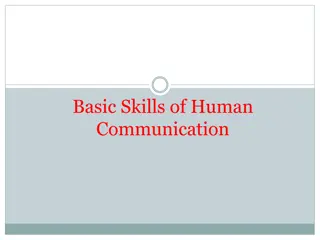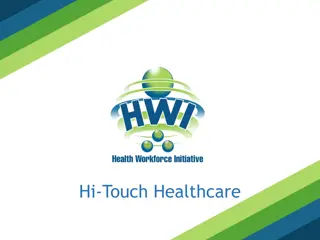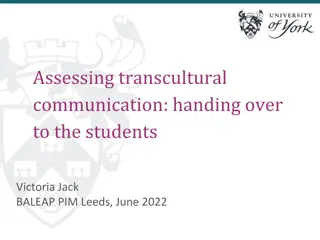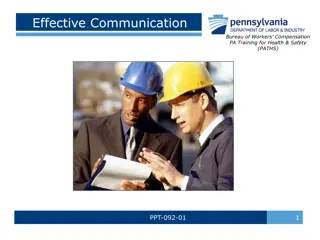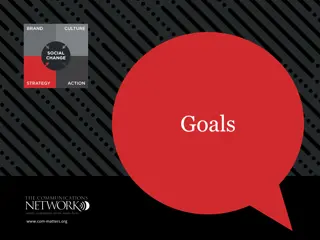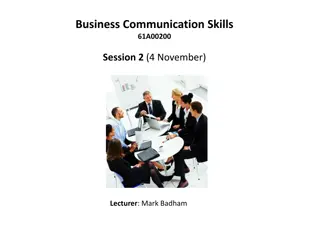Importance of Effective Communication Skills
Developing effective communication skills is crucial in all aspects of life. Explore the key components of good communication, including active listening, non-verbal cues, and understanding your audience. Learn how to be taken seriously by using methods like the STAR technique. Enhance your communication abilities for personal and professional success.
Download Presentation

Please find below an Image/Link to download the presentation.
The content on the website is provided AS IS for your information and personal use only. It may not be sold, licensed, or shared on other websites without obtaining consent from the author.If you encounter any issues during the download, it is possible that the publisher has removed the file from their server.
You are allowed to download the files provided on this website for personal or commercial use, subject to the condition that they are used lawfully. All files are the property of their respective owners.
The content on the website is provided AS IS for your information and personal use only. It may not be sold, licensed, or shared on other websites without obtaining consent from the author.
E N D
Presentation Transcript
The Importance of Communications as a Skill Madonna Walsh Senior Communications Leader Crisis Communications Consultant
Agenda About me Good communications Key Components of a good communications Non-verbal communications Being taken seriously Know your audience Q&A Appendix: A career in Communications
About me Madonna Walsh 20+ years professional communicator Grew up in Chicago Love to travel 37 countries so far Projects and programs on six continents Specialty: Crisis and Risk Communications MSc Threat & Response Management, University of Chicago BS Communications / Public Relations, Illinois State University
Good communications Good Communications = Active Listening Being present, paying attention Authentic Neutral Being clear and direct Have an objective in mind Open to other points of view Passionate but not over-emotional Poor Communications Portraying an image that you are not Speaking on topics without facts Not having clear messages or objectives Not listening to others Being over-emotional
Key components of good communications 1. Listen more, talk less. 2. 3. 4. 5. 6. 7. Know your audience. Body language matters. Double check your message before hitting send. Write things down. Pick up the phone. Think before you speak. 8. Maintain a positive attitude and smile (when appropriate).
Non-verbal communications Facial expressions Gestures Paralinguistics (such as loudness or tone of voice) Body language Personal space Eye gaze, touch Appearance Artifacts (objects and images)
Being taken seriously STAR method helps you think before you speak Situation: Set the scene and give the necessary details of your example. Task: Describe what your responsibility was in that situation. Action: Explain exactly what steps you took to address it. Result: Share what outcomes your actions achieved.
Know your audience Building trust transparency, truthfulness Think from their perspective Ask: Who am I writing for/speaking to? Who else needs to know? Why do they care about what I m saying? What are the main concerns and problems that they wish to solve?
Active listening Active listening means engaging in a discussion. Having real discussions. Hashing out different ideas and helping by drawing out a person s latent feelings. It involves the act of empathy; of putting oneself in the shoes of the other person, and asking questions to help the other person think clearly and make sense of their feelings. Understanding your audience is crucial to effective communications.
Connect with me on LinkedIn https://www.linkedin.com/in/madonna-walsh-6512b64/
Types of Communications roles Technician Specialist Facilitator Problem Solver Project Manager Tactical executor who writes press releases/blogs/etc, pitches media stories, works social media, creates websites Subject matter expert on particular topics (healthcare) industries (aerospace) practices (analyst relations) public affairs (government) Creator of opportunities; often networking, special events, activities, press conferences, product launches, etc Collaborator who works with others to find solutions to problems; can be business-related or crisis-related such as natural, mechanical or manmade Leader who ensures resources are distributed as needed; often takes on one or more roles
Preparing for a Job in Communications Course work in High School Year 9 and 10 Year 11 Year 12 Listening Speaking Writing English 2ndLanguage Journalism Intro to Media Production Theatre 1 Video and Audio Production Language Arts English Literature Composition Creative Writing Chicago Literature Choices in Literature Film in Literature Graphic Novels Language, Power & Social Justice Modes of Rhetoric and Composition Begin NOW to keep a portfolio of your work. Write for school or local newspaper, church bulletin, charity, etc .
Preparing for a Job in Communications Community College Communications, Literature and Foreign Languages Fine Arts and Humanities Marketing and Management (Business) Social Sciences University Communication Studies English Journalism Marketing Mass Media Public Relations
Advancement Opportunities Volunteer Experience Training Certificates Master s Degree
Types of Employers Agencies NGOs Government Public Relations Social Media Digital Communications Marketing Advertising Corporations Private Businesses Non-profits Media Local County State Federal Military International
Compensation Median Salaries for all disciplines: Assistant starting salary: $45k Associate/Account Executive (2 3 years): $58k Manager (4-6 years): $74k Senior manager (7-8 years): $101k Director (8-12 years): $120k Vice President (15+ years): $180k Senior VP (20+ years): $210k CCO (20+ years) Median Low High
Employment Outlook According to the U.S. Bureau of Labor Statistics Media and Communications roles 14% job growth between 2020 and 2030 Public Relations roles 11% job growth between 2020 and 2030
Spin Doctor Spin Doctor
